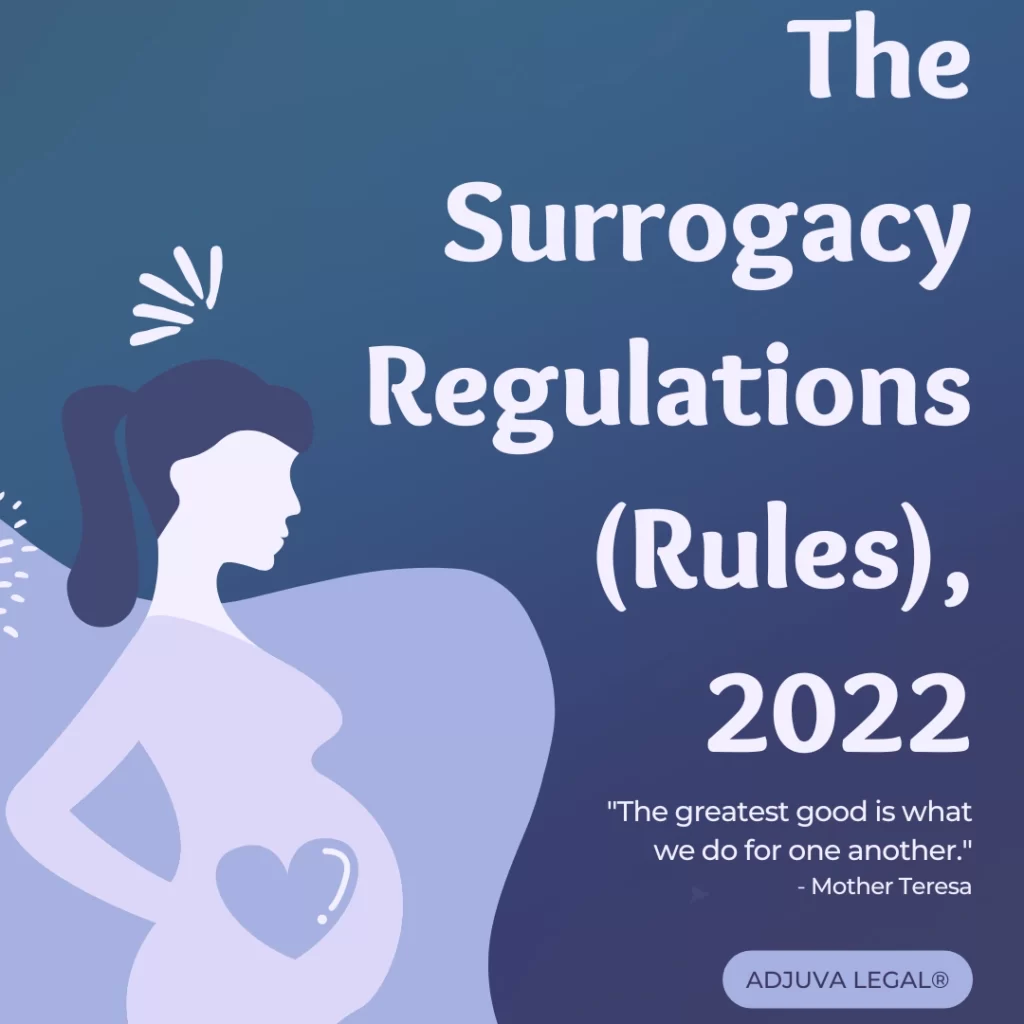Purpose
Surrogacy is a statutory medical procedure to counter the issue of infertility. It aids the couple or a woman seeking a child of her own. The surrogacy Act was enforced in the year 2021 to legalize and promote the ethical process of obtaining a child.
There were several lacunae in the existing terms that required the enforcement of rules related to the existing act. Hence, in the exercise of the power conferred in section 50 of the Surrogacy (Regulation) Act, 2021, the Surrogacy Regulations (Rules), 2022 were notified in June 2022 by the Ministry of Health and Family Welfare.
Reason and Aftermath
Certain conditions are mentioned as condition precedents for women or couples seeking a child through surrogacy. The conditions are mentioned below:
- The woman must be infertile.
- The woman either does not have a uterus, or malfunctioned uterus, or missing a uterus or it was medically removed from her body due to any accident, injury or disease.
- The reason for this is medically not explainable for failure in conceiving.
- An impossible pregnancy because of a terminal disease.
- The woman failed to become pregnant even after several trials of In vitro fertilization or Intracytoplasmic sperm injection.
Highlights of the Bill
The aforementioned rules have proposed to alter various provisions of law some of which are mentioned below:
- There must be a Registry at central, state and UT levels for the registration of surrogacy clinics. A board to deal with such matters is mandatory to be established.
- Every such clinic must have one gynaecologist, one anaesthetic, one counsellor and an embryologist.
- No unauthorized clinic shall encounter any case or employ any person unqualified under the act.
- Form 1 is required to be filled out for registration.
- A woman intending to become a surrogate must be aged between 35-45 years and cannot become a surrogate more than once.
- The Surrogate must entrust her free consent for the procedure.
- She cannot attempt the procedure of surrogacy more than 3 times.
- A couple seeking to get a child from surrogacy must be a legally wedded couple and shall not have any biological, surrogate or adopted child.
- Men must be aged between 26 to 55 years and women seeking surrogacy must be between 20-50 years.
- An affidavit before a Metropolitan Magistrate or a Judicial Magistrate of the first class shall be signed by the woman or couple who is/are intending to render guarantee under section 2 of the Surrogacy (Regulation) Act, 2021.
- The couple is obligated to take an Infertility Certificate from the National or State-Assisted Reproductive Technology and Surrogacy Board.
- Women or couples seeking surrogacy are obligated to ensure the surrogate with general health insurance coverage for a specified duration of thirty-six months from an insurance company or an agent recognized by the Insurance Regulatory and Development Authority established under the provisions of the Insurance Regulatory and Development Authority Act, 1999 for an amount which is sufficient enough to cover all expenses for all complications arising out of pregnancy and the post-pregnancy health issues tackled by the surrogate.
- The surrogate must have a child of her own.
- The surrogate must not be genetically or by blood attached to the child.
- The surrogate mother may be allowed for abortion during the process of surrogacy as per the provisions of the Medical Termination of Pregnancy Act, 1971
- The child born out of surrogacy will be termed the biological child of the couple.
- The couple cannot abandon a child born out of surrogacy.
- The surrogacy clinic, or the intending woman, or couple may, within a period of thirty days from the date of receipt of the communication relating to the order of rejection of the application, suspension or cancellation of registration by the appropriate authority under section 13 and communication relating to the rejection of the certificates under section 14, prefer an appeal against such order.
Commercial Surrogacy
Commercial Surrogacy refers to undergoing the procedure of surrogacy for monetary purposes. Commercial surrogacy is criminalized in India. A petition was filed by Karan Balraj Mehta in Karan Balraj Mehta & Ors vs. Union of India to decriminalize the entire concept of commercializing the procedure.
Nonetheless, the matter is still under consideration and it is a bone of contention in the legal and medical regime. The petitioner contended that Article 21 of the Constitution includes the Right to bodily integrity in the Right to Privacy that entrusts the power to the woman to choose if she wants to bear a child or not.
The right to bodily autonomy must be free from judicial interruptions. But, the commercial practice will lead to a harsh pathway for couples seeking a child to surrogacy.
by Khushi Shukla
Disclaimer: The opinions expressed within this article are the personal opinions of the author. The facts and opinions appearing in the article do not reflect the views of Adjuva Legal and Adjuva Legal does not assume any responsibility or liability for the same.







